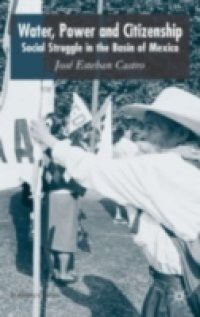Approaching from a historical-sociological perspective, the book provides an interdisciplinary investigation of the interrelationship of water and citizenship in Mexico. Drawing on the work of Norbert Elias, Marx, T.H.Marshall, and von Clausewitz, among others, the work provides an empirical study of the import of social struggle in the explanation of structural social change from pre-Columbian times to the late twentieth century. The evolution of water's manifold social character and values, as a source of power, as a public good, as a commodity, or as a universal right is examined in the light of ever changing and mutually binding social and ecological processes. The basin's rich water history becomes the vantage point to cast light on one of the most crucial challenges facing the international community: the protracted social inequalities that account for the fact that a large part of the world population is affected by preventable water-related diseases and death. Castro concludes that, in the face of the current reversal of the values of universalism, the defence and further conquest of the territory of citizenship has become a truly radical endeavour, which in this particular sphere of human activity takes the form of a struggle to eliminate water inequality and injustice.

